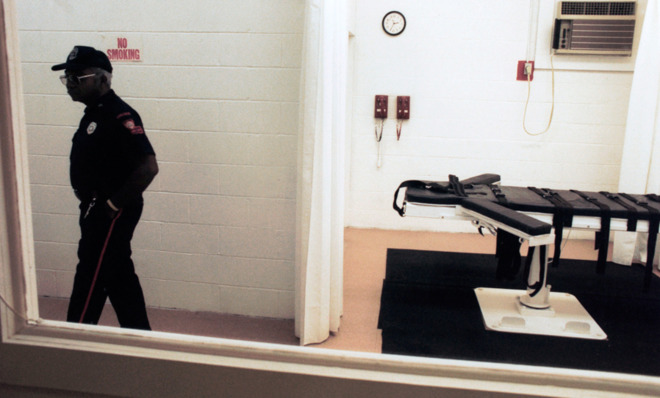John Paul Stevens is right: The death penalty is unconstitutional
Oklahoma's botched execution of Clayton Lockett has only underscored the barbarism of capital punishment


A free daily email with the biggest news stories of the day – and the best features from TheWeek.com
You are now subscribed
Your newsletter sign-up was successful
On Tuesday night, the state of Oklahoma executed Clayton Lockett — sort of. After a horribly botched execution that saw Lockett writhe and gasp in clear agony for 40 minutes, he finally died of a heart attack.
The state of Oklahoma is hardly squeamish about the death penalty, since it executes by far more people per capita than any other American state. But this gruesome torture and indirect execution was too much for Oklahoma Governor Mary Fallin (R), who stayed the execution of Charles Warner (who was also scheduled to die on April 28) for two weeks. This particularly inept deployment of capital punishment not only reflects serious procedural flaws in Oklahoma's justice system, but is another illustration that a "humane death penalty" is a contradiction in terms.
To be clear, Lockett and Warner are not innocent men, but are guilty of their own acts of barbarism. Lockett killed a 19-year-old woman and had accomplices bury her alive in a shallow grave, and Warner was convicted of sexually assaulting and murdering an infant. But their horrible acts cannot justify further horrible acts on the part of the state, which implicate us all. And this particularly horrible exercise of the death penalty is in many ways all too typical.
The Week
Escape your echo chamber. Get the facts behind the news, plus analysis from multiple perspectives.

Sign up for The Week's Free Newsletters
From our morning news briefing to a weekly Good News Newsletter, get the best of The Week delivered directly to your inbox.
From our morning news briefing to a weekly Good News Newsletter, get the best of The Week delivered directly to your inbox.
The torture of Lockett was the predictable result of a failed experiment. Oklahoma attempted to execute the condemned prisoner with a new lethal injection "cocktail" that had not been tried before, composed of drugs that came from a secret source. After an ugly conflict between Oklahoma's courts and Fallin and her allies — an episode that threatened the judiciary's independence, as detailed by Andrew Cohen — the state went ahead with an untried method. It shouldn't be terribly surprising that the outcome was disastrous.
And yet, the problem goes well beyond problems with any specific method of lethal injection. Because it has the superficial trappings of a medical procedure, lethal injection has become the dominant form of death penalty in the United States, viewed as a more "humane" alternative to methods such as hanging and the gas chamber. But its lofty reputation has no discernible justification. Research by the eminent legal scholar Austin Sarat has found that "executions by lethal injection are botched at a higher rate than any of the other methods employed since the late 19th century, 7 percent."
Combined with the fact that it's impossible to know whether even non-botched lethal injections inflict pain, there's no reason whatsoever to believe that lethal injection is any better than the deeply flawed methods it replaced — indeed, it may well be worse.
And that's really only scratching the surface of the problem. A recent study shows that as many as 300 innocent people were sentenced to death in the 30 years since the death penalty was reinstated in 1973, and innocent people have almost certainly been put to death.
A free daily email with the biggest news stories of the day – and the best features from TheWeek.com
The two defendants in this case notwithstanding, the death penalty does not reliably identify the "worst" offenders. A more accurate description would be that it is arbitrarily applied to some people, while other people in the same states who commit similar or more heinous crimes are spared. Furthermore, the death penalty is disproportionately applied to cases of African-Americans accused of killing white victims.
When the Supreme Court upheld the constitutionality of lethal injection in the 2007 case Baze v. Rees, Justice John Paul Stevens quoted his predecessor Byron White to express the view that the death penalty as currently applied in the United States represents "the pointless and needless extinction of life with only marginal contributions to any discernible social or public purposes. A penalty with such negligible returns to the State [is] patently excessive and cruel and unusual punishment violative of the Eighth Amendment."
In his new book Six Amendments, Stevens proposes amending the Constitution to explicitly make the death penalty unconstitutional. I agree with his proposed amendment, but it is becoming increasingly hard to deny that the death penalty as practiced already violates the Eight Amendment's prohibition on cruel and unusual punishment.
Scott Lemieux is a professor of political science at the College of Saint Rose in Albany, N.Y., with a focus on the Supreme Court and constitutional law. He is a frequent contributor to the American Prospect and blogs for Lawyers, Guns and Money.
-
 5 calamitous cartoons about the Washington Post layoffs
5 calamitous cartoons about the Washington Post layoffsCartoons Artists take on a new chapter in journalism, democracy in darkness, and more
-
 Political cartoons for February 14
Political cartoons for February 14Cartoons Saturday's political cartoons include a Valentine's grift, Hillary on the hook, and more
-
 Tourangelle-style pork with prunes recipe
Tourangelle-style pork with prunes recipeThe Week Recommends This traditional, rustic dish is a French classic
